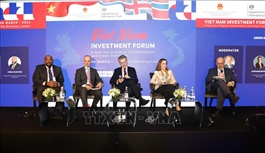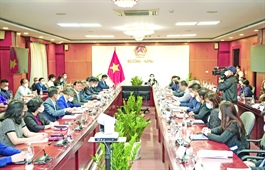Reacting to force majeure situations
Reacting to force majeure situations
The concept of force majeure is not unfamiliar with the Vietnamese business community as the COVID-19 pandemic has disrupted many companies’ operations. Subsequently, the Russia-Ukraine situation and its consequences are causing fluctuations in the international market, which may lead to unforeseeable outcomes for every enterprise.
Business leaders should brace themselves for similar incidents, whether macro or micro, to prevent losses from both commercial and legal perspectives.
Under Vietnamese law, an event is considered a force majeure event if it has all of three particular elements. Firstly, externality: the event must happen out of the control of the impact of the contracting parties; second is unpredictability, meaning the contracting parties were unable to foresee or predict such an event; and third is irresistibility, meaning the affected party is unable to remedy or prevent such event from happening despite all necessary measures to the extent permissible.
It is tempting to invoke force majeure to avoid liability if a party fails to perform its obligations in the face of the Russia-Ukraine situation or the pandemic, as such events are external, unpredictable, and irresistible by normal contracting parties. However, the condition for invoking force majeure as an excuse for contract non-performance is that the event must be the cause of or reason for the breach.
As such, whether to apply force majeure rules to events such as conflict or a pandemic is not always a simple yes-or-no matter. The key question is whether the breach is actually “due to” them as a whole, or through specific consequences such as embargoes, economic sanctions, refugee crisis, and forced closure of businesses.
In a Vietnamese law context, there are at least two approaches to determine if a breach actually happened due to a force majeure event. The first is that the breach is due to the force majeure event causing performance to be impossible. Take for example a cargo ship restrained by an embargo. Under this approach, assuming the embargo is a force majeure event, the seller shall only be exempted from liability if it is absolutely impossible for the seller, by all means, to have the goods delivered on time to the purchaser.
Otherwise, if the seller still has financial capability to acquire new goods of the same kind from other suppliers to make delivery, the seller cannot invoke force majeure as an excuse, because the obligation to provide the goods, strictly speaking, is not impossible.
The second approach, more lenient for the breacher, is that the breaching party is exempted from liability if the force majeure event causes performance to be impractical. Using the same example of the cargo ship, if buying goods from other suppliers to provide for the buyer results in excessive expenses or causes unreasonable disadvantages to the seller, then the seller may be exempted from non-performance liabilities on the grounds of a force majeure event.
As Vietnamese law is not expressly clear on the two said approaches, the outcome of a force majeure dispute will likely depend on the language of the contract and the case-by-case assessment of the tribunal. It should be noted that, where the law is not entirely clear, the tribunal can take equity into account to render a balanced ruling for both parties, by mixing up the two impossibility and impracticality approaches, if either alone imposes an unreasonable or unfair burden on a party.
As legislation on force majeure events is not as detailed as it can be, businesses have been acquainted with drafting detailed contract terms to exempt liabilities in cases of force majeure. With that, there are some necessary contract terms that may be helpful for businesses.
In terms of a definition of a force majeure event, usually, contracts refer to the three elements of force majeure as provided by the Civil Code 2015. Nevertheless, the parties are free to agree on another set of elements of force majeure, which can be different from the three standard elements (provided that such deviation is not contrary to public policy and good morals).
As such, parties can tailor the contract according to their needs and worries about future incidents. Further, the contract can also list examples of force majeure events that should not be disputed by the parties, such as wars, governmental sanctions, natural disasters, epidemics, fire, strikes, demonstrations, accidents, economic crisis, inflation, economic recession, and economic depression.
The parties may also add the effects of the force majeure event that invokes liability exemption for non-performance, such as a decrease in revenue to a certain amount, business locations being forced to be closed at the decisions of competent authorities, accumulated business losses for more than six months. To be effective, the list should be drafted as a mixture of particularities and generalities.
Other contract issues to take into account include the obligations of each party when it faces a force majeure event, such as giving notice to the other party or taking action to limit the damage caused; and the right of each party in case of force majeure, such as detention of property, temporary or permanent suspension of the contract, cancellation/rescission of the contract, and substitution of various obligations.
Finally, there is leeway for re-negotiating the contract’s terms on the grounds of mutual benefits and good faith. As legal disputes in court/arbitration are costly and not always necessary, the contract may also provide the opportunity for parties to discuss the best solution for both sides in case of force majeure.
Contract drafters should also not overlook other contract clauses that may be relevant to force majeure, such as transfer of risk/title, payment, late payment interest, penalties, and liquidated damages, etc.
Furthermore, other legal tools should also be taken into account, such as purchasing insurance policies (and making clear which party is to gain from the sum insured in cases of force majeure), bank guarantees, and also taking security assets.
























